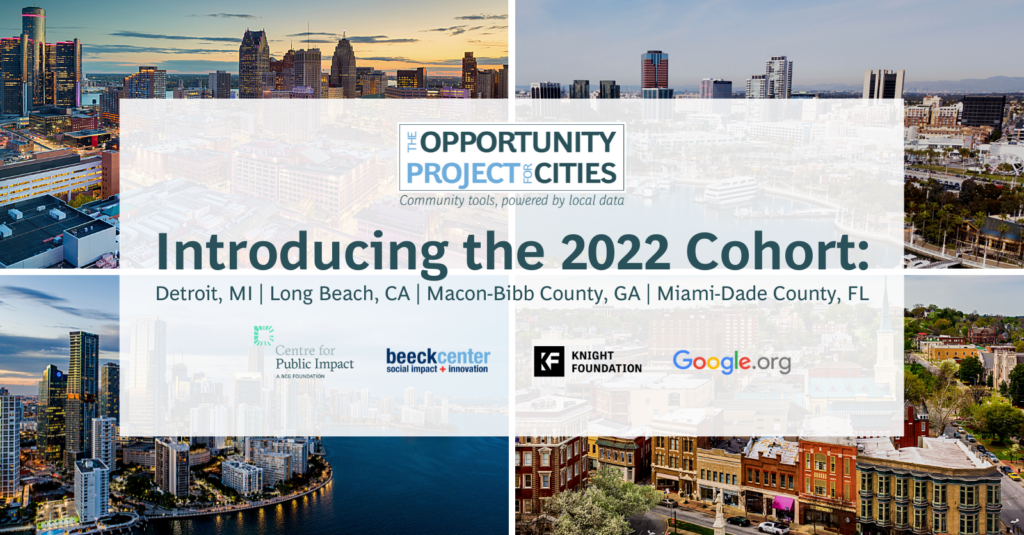Detroit, Long Beach, Macon-Bibb County, and Miami-Dade County work with residents to solve pressing challenges with local data

Washington, D.C. – Today, the Beeck Center for Social Impact + Innovation at Georgetown University (Beeck Center) and Centre for Public Impact (CPI) announce that four new communities will join The Opportunity Project for Cities. During the program, cities and counties will participate in a 20-week design sprint that partners government practitioners and community organizations with pro bono support from Google whose employees will help to research, design and create digital tools that address residents’ most pressing needs.
Communities joining The Opportunity Project for Cities include:
- Detroit, MI will accelerate its digital equity initiatives by increasing residents’ access to broadband internet.
- Long Beach, CA looks to strengthen the community’s climate resilience by expanding urban forest coverage.
- Macon-Bibb County, GA will support thriving neighborhoods and local residents by removing neighborhood blight.
- Miami-Dade County, FL plans to support local entrepreneurs and small business owners by lowering the barriers to starting a business.
“While our cohort includes a diverse group of local governments from across the country focused on a variety of complex challenges, they all share a commitment to empowering residents who are closest to problems and have great ideas on how to solve them,” said Josh Sorin, program director at the Centre for Public Impact. “This program utilizes a unique model that brings together government, community organizations, and Google technologists from the start, creating the space and structure for them to work together to deeply understand difficult problems and co-create solutions, all the while building trust and relationships in the process that will pay dividends long after this project is complete.”
The Opportunity Project for Cities is a three-year program wherein local governments, community leaders, and Google technologists (including Product Managers, Software Engineers, UX Researchers, UX Designers and more) work with residents to prototype digital tools that use open data to address local challenges.
In the long term, The Opportunity Project for Cities encourages a culture shift to a more transparent and responsive government that is better equipped to positively impact the community. The Opportunity Project for Cities builds a culture of government transparency, accessibility, and responsiveness that strengthens trust with residents and lays the foundation for lasting community-driven innovation.
“Our model leverages open data, technology, and community inclusion to create open source solutions to common challenges facing local governments” said Cori Zarek, executive director of the Beeck Center for Social Impact + Innovation at Georgetown University. “Working open source creates opportunities to scale and replicate solutions across communities. As this program grows, our hope is to see more communities adapt solutions from each other.”
This is the second cohort of The Opportunity Project for Cities and builds on the successes and learnings from the 2021 sprint in San José, CA, and Saint Paul, MN where partners created tools to address local housing issues. The program was inspired by the U.S. Census Bureau’s The Opportunity Project and adapted for local contexts by the Centre for Public Impact and the Beeck Center for Social Impact + Innovation at Georgetown University. The Opportunity Project for Cities is supported by the John S. and James L. Knight Foundation, and pro bono technical support from Google.org.